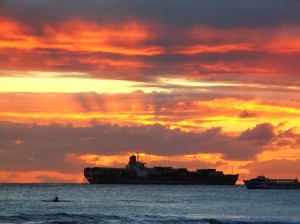WTO Problems Won’t Stop Trade Facilitation
This article first appeared in Law360 and has been reprinted here with permission.
World Trade Organization Director-General Roberto Azevedo has offered little hope for overcoming the obstacle presented by India in blocking the protocol necessary to finalize the WTO trade facilitation agreement reached in Bali Dec. 7, 2013.[1] Meanwhile, there is a great deal of discussion about what this means for the WTO, but what does it mean for trade facilitation? I would suggest that while this development means a lot to the WTO it means little to trade facilitation. The train has left the station as far as trade facilitation goes because countries and business appreciate the merits of its implementation.
At the same time, leaders are wringing their hands about the unfortunate situation at the WTO, the World Bank and the WTO have joined forces to provide trade facilitation support to developing and least-developed countries.[2] In the WTO press release announcing this joint effort, World Bank Group President Jim Yong Kim noted that “[t]rade is a critical component to ending poverty and boosting shared prosperity.” He further noted that “[o]ur own research tells us that African countries are missing out on opportunities for billions of dollars in extra export earnings because of existing trade barriers. Trade Facilitation was one of the important elements of the outcome from the Bali Ministerial and we remain fully committed to supporting implementation of the Bali deal as we see the development benefits of reducing costs to trade.”
As stated by the WTO, “[t]rade facilitation aims to reduce barriers developing countries now face moving goods quickly and cost effectively by increasing port efficiency, improving customs and regulatory environments, and upgrading infrastructure to increase trade exports.” The WTO launched a Trade Facilitation Agreement Facility in July 2014 “to ensure that no country is left behind and all are able to access the support they need.” The World Bank Group also launched a new Trade Facilitation Support Program in June 2014 to assist developing countries in implementing the Agreement.
Development banks and countries around the world have also recognized the importance of trade facilitation toward stimulating trade and investment in their countries and regions of the world. One just has look at the development projects around the globe.
So what does Trade facilitation mean to business? A lot. Trade facilitation, once considered by the WTO as low-hanging fruit for an agreement, but which took the WTO 10 years to negotiate, has mobilized business. Why? According to a report by the International Chamber of Commerce, improvements in trade facilitation could boost the world economy by $1 trillion annually and result in job gains of 21 million. The Organization of Economic Cooperation and Development found that implementation of the agreement could have a potential impact in trade cost reductions ranging from 11.7 percent to as much 15.1 percent.
For these reasons, business groups such as the ICC want to see the agreement implemented around the world. In fact, 14 business groups from the U.S., Europe, East Africa, Japan, South Korea and Canada are urging WTO members to allow “prompt implementation” of the agreement.[3]
Various aspects of the agreement, such as transparency, automated entry and payment of duties, are also seen by business as powerful measures to address corruption at the border, a significant impediment to trade and investment in the developing world. Corruption at ports and at customs is such a significant problem that the maritime industry has organized a collective action effort called the Maritime Anti-Corruption Network, which seeks to “work toward its vision of a maritime industry free of corruption that enables fair trade to the benefit of society at large.”[4] It goes without question that implementation of the trade facilitation agreement would aid in this effort.
So what does the WTO’s failure to implement the trade facilitation agreement as a multilateral agreement mean for trade facilitation? Probably not all that much. The countries that recognize the benefits of the agreement in terms of economic development and seize the opportunity for funding by organizations like the WTO, World Bank, USAID and the development banks, will prosper. Those that do not will likely lag behind.
[1] Azevedo Paints Bleak Picture For WTO As TFA Remains Stuck In Quagmire,” Inside U.S. Trade World Trade Online, Posted Oct. 16, 2014.
[2] WTO Press Release Oct. 10, 2014, PRESS/725.
[3] Inside U.S. Trade’s World Trade Online “Azevedo Paints Bleak Picture For WTO As TFA Remains Stuck In Quagmire.” (Oct. 16, 2014).
[4]http://www.bsr.org/en/our-work/working-groups/maritime-anti-corruption-network.
